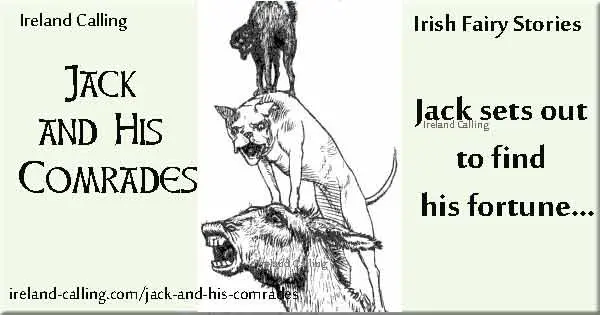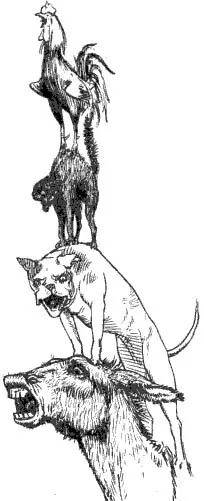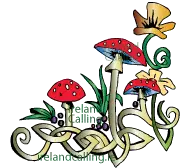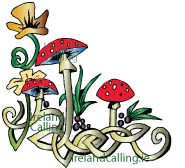Introduction: Jack and His Comrades is a very popular Irish story about how a young lad goes off to seek his fortune, teams up some farmyard animals and then outwits a group of robbers.

The story starts with Jack living at home with his mother. They have no money so Jack decides to leave to seek his fortune. As he goes, his mother asks if he would rather have half a cake with her blessing or a whole cake with her curse. He chooses the half cake and she gives him a thousand blessings.
Jack then helps to rescue a donkey, a dog, a cat and cockerel and they team up together. They chance upon some robbers in a cottage. All the animals bellow out at the same time as Jack gives a command to attack. The robbers are terrified and run off leaving all their stolen treasure behind.
Later that night, one of the robbers returns. He can’t see anything because it is so dark. When he is attacked by the animals he thinks he’s being attacked by ferocious fighting men and runs off. The next morning, Jack and the animals bring the money back to its rightful owner Lord Dunlavin.
Their reward is to be employed in comfortable jobs at the castle. Jack sends for his mother and they live happily thereafter.
More on Jack and His Comrades.

The is the well known version of Jack and His Comrades as told by Joseph Jacobs in his two volume collection of Celtic Fairy Tales (1891-4)
Once there was a poor widow, as often there; has been, and she had one son. A very scarce summer came, and they didn’t know bow they’d live till the new potatoes would be fit for eating. So Jack said to his mother one evening, “Mother, bake my cake, and kill my hen, till I go seek my fortune ; and if I meet it, never fear but I’ll soon be back to share it with you.”

So she did as he asked her, and he set out at break of day on his journey. His mother came along with him to the yard gate, and says she, “Jack, which would you rather have, half the cake and half the hen with my blessing, or the whole of ’em with my curse?”
“O musha, mother,” says Jack, “why do you ax me that question? sure you know I wouldn’t have your curse and Damer’s estate along with it.”
“Well, then, Jack,” says she, ” here’s the whole lot of ’em, with my thousand blessings along with them.” So she stood on the yard fence and blessed him as far as her eyes could see him.
Well, he went along and along till he was tired, and ne’er a farmer’s house he went into wanted a boy. At last his road led by the side of a bog, and there was a poor ass up to his shoulders near a big bunch of grass he was striving to come at.
“Ah, then, Jack asthore,” says he, ” help me out or I’ll be drowned.”
“Never say’t twice,” says Jack, and he pitched in big stones and sods into the slob, till the ass got good ground under him.
“Thank you, Jack,” says he, when he was out on the hard road; ” I’ll do as much for you another time. Where are you going?”
“Faith, I’m going to seek my fortune till harvest comes in, God bless it.”
“And if you like,” says the ass, “I’ll go along with you; who knows what luck we may have!”
“With all my heart, it’s getting late, let us be jogging.” Well, they were going through a village, and a whole army of gossoons were hunting a poor dog with a kettle tied to his tall. He ran up to Jack for protection, and the ass let such a roar out of him, that the little thieves took to their heels as if the ould boy was after them.

“More power to you, Jack,” says the dog.
“I’m much obleeged to you where is the baste and yourself going?”
“We’re going to seek our fortune till harvest comes in.”
“And wouldn’t I be proud to go with you!” says the dog, “and get rid of them ill conducted boys; purshuin’ to ’em.”
“Well, well, throw your tail over your arm, and come along.”
They got outside the town, and sat down under an old wall, and Jack pulled out his bread and meat, and shared with the dog; and the ass made his dinner on a bunch of thistles. While they were eating and chatting, what should come by but a poor half-starved cat, and the moll-row he gave out of him would make your heart ache.
“You look as if you saw the tops of nine houses since breakfast,’ says Jack ; “here’s a bone and something on it.”
“May your child never know a hungry belly!” says Tom ; “it’s myself that’s in need of your kindness. May I be so bold as to ask where yez are all going?”
“We’re going to seek our fortune till the harvest comes in, and you may join us if you like.”
“And that I’ll do with a heart and a half,” says the cat, and thank’ee for asking me.”‘
Off they set again, and just as the shadows of the trees were three times as long as themselves, they heard a great cackling in a field inside the road, and out over the ditch jumped a fox with a fine black cock in his mouth.
“Oh, you anointed villain! ” says the ass, roaring like thunder.
“At him, good dog! ” says Jack, and the word wasn’t out of his mouth when Coley was in full sweep after the Red Dog. Reynard dropped his prize like a hot potato, and was off like shot, and the poor cock came back fluttering and trembling to Jack and his comrades.
“O musha, naybours!” says he, “wasn’t it the heigth o’ luck that threw you in my way! Maybe I won’t remember your kindness if ever I find you in hardship; and where in the world are you all going?”
“We’re going to seek our fortune till the harvest comes in; you may join our party if you like, and sit on Neddy’s crupper when your legs and wings are tired.”
Well, the march began again, and just as the sun was gone down they looked around, and there was neither cabin nor farm house in sight.
“Well, well,” says Jack, ” the worse luck now the better another time, and it’s only a summer night after all. We’ll go into the wood, and make our bed on the long grass.”
No sooner said than done. Jack stretched himself on a bunch of dry grass, the ass lay near him, the dog and cat lay in the ass’s warm lap, and the cock went to roost in the next tree.
Well, the soundness of deep sleep was over them all, when the cock took a notion of crowing.

“Bother you, Black Cock!” says the ass “you disturbed me from as nice a wisp of hay as ever I tasted. What’s the matter?”
“It’s daybreak that’s the matter: don’t you see light yonder?”
“I see a light indeed,” says Jack, “but it’s from a candle it’s coming, and not from the sun. As you’ve roused us we may as well go over, and ask for lodging.”
So they all shook themselves, and went on through grass, and rocks, and briars, till they got down into a hollow, and there was the light coming through the shadow, and along with it came singing, and laughing, and cursing.
“Easy, boys!” says Jack: “walk on your tippy toes till we see what sort of people we have to deal with.”
So they crept near the window, and there they saw six robbers inside, with pistols, and blunderbushes, and cutlashes, sitting at a table, eating roast beef and pork, and drinking mulled beer, and wine, and whisky punch.
“Wasn’t that a fine haul we made at the Lord of Dunlavin’s!” says one ugly-looking thief with his mouth full, “and it’s little we’d get only for the honest porter! here’s his purty health!”
“The porter’s purty health!” cried out every one of them, and Jack bent his finger at his comrades.
“Close your ranks, my men, says he in a whisper, “and let every one mind the word of command.”
So the ass put his fore-hoofs on the sill of the window, the dog got on the ass’s head, the cat on the dog’s head, and the cock on the cat’s head. Then Jack made a sign, and they all sung out like mad.
“Hee-haw, hee-haw!” roared the ass; “bow-wow!” barked the dog; “meaw-meaw!” cried the cat; “cock-a-doodle-doo!’ crowed the cock.
“Level your pistols!” cried Jack, “and make smithereens of ’em. Don’t leave a mother’s son of ’em alive; present, fire!”
With that they gave another halloo, and smashed every pane in the window. The robbers were frightened out of their lives. They blew out the candles, threw down the table, and skelped out at the back door as if they were in earnest, and never drew rein till they were in the very heart of the wood.
Jack and his party got into the room, closed the shutters, lighted the candles, and ate and drank till hunger and thirst were gone. Then they lay down to rest ; – Jack in the bed, the ass in the stable, the dog on the door-mat, the cat by the fire, and the cock on the perch.
At first the robbers were very glad to find themselves safe in the thick wood, but they soon began to get vexed.
“This damp grass is very different from our warm room,” says one.
“I was obliged to drop a fine pig’s foot,” says another.

“I didn’t get a tayspoonful of my last tumbler,” says another.
“And all the Lord of Dunlavin’s gold and silver that we left behind! ” says the last.
“I think I’ll venture back,” says the captain, ” and see if we can recover anything.”
“That’s a good boy!” said they all, and away he went.
The lights were all out, and so he groped his way to the fire, and there the cat flew in his face, and tore him with teeth and claws. He let a roar out of him, and made for the room door, to look for a candle inside. He trod on the dog’s tail, and if he did, he got the marks of his teeth in his arms, and legs, and thighs.
“Thousand murders! ” cried he ; “I wish I was out of this unlucky house.”
When he got to the street door, the cock dropped down upon him with his claws and bill, and what the cat and dog done to him was only a flay-bite to what he got from the cock.
“Oh, tattheration to you all, you unfeeling vagabones!” says he, when he recovered his breath; and he staggered and spun round and round till he reeled into the stable, back foremost, but the ass received him with a kick on the broadest part of his small clothes, and laid him comfortably on the dunghill.
When he came to himself, he scratched his head, and began to think what happened him; and as soon as he found that his legs were able to carry him, he crawled away, dragging one foot after another, till he reached the wood.
“Well, well,” cried them all, when he came within hearing, “any chance of our property?”
“You may say chance,” says he, “and it’s itself is the poor chance all out. Ah, will any of you pull a bed of dry grass for me? All the sticking-plaster in Enniscorthy will be too little for the cuts and bruises I have on me. Ah, if you only knew what I have gone through for you! When I got to the kitchen fire, looking for a sod of lighted turf, what should be there but an old woman carding flax, and you may see the marks she left on my face with the cards. I made to the room door as fast as I could, and who should I stumble over but a cobbler and his seat, and if he did not work at me with his awls and his pinchers you may call me a rogue. Well, I got away from him somehow, but when I was passing through the door, it must be the divel himself that pounced down on me with his claws, and his teeth, that were equal to sixpenny nails, and his wings-ill luck be in his road! Well, at last I reached the stable, and there, by way of salute, I got a pelt from a sledge-hammer that sent me half a mile off. If you don’t believe me, I’ll give you leave to go and judge for yourselves.”
“Oh, my poor captain,” says they, “we believe you to the nines. Catch us, indeed, going within a hen’s race of that unlucky cabin!”

Well, before the sun shook his doublet next morning, Jack and his comrades were up and about. They made a hearty breakfast on what was left the night before, and then they all agreed to set off to the castle of the Lord of Dunlavin, and give him back all his gold and silver. Jack put it all in the two ends of a sack and laid it across Neddy’s back, and all took the road in their hands. Away they went, through bogs, up hills, down dales, and sometimes along the yellow high road, till they came to the hall-door of the Lord of Dunlavin, and who should be there, airing his powdered head, his white stockings, and his red breeches, but the thief of a porter.
He gave a cross look to the visitors, and says he to Jack, “What do you want here, my fine fellow? there isn’t room for you all.”
“We want,” says Jack, “what I’m sure you haven’t to give us – and that is, common civility.”
“Come, be off, you lazy strollers!” says he, “while a cat ‘ud be licking her ear, or I’ll let the dogs at you.”
“Would you tell a body,” says the cock that was perched on the ass’s head, “who was it that opened the door for the robbers the other night?”
Ah! maybe the porter’s red face didn’t turn the colour of his frill, and the Lord of Dunlavin and his pretty daughter, that were standing at the parlour window unknownst to the porter, put out their heads.
“I’d be glad, Barney,” says the master, “to hear your answer to the gentleman with the red comb on him.”
“Ah, my lord, don’t believe the rascal; sure I didn’t open the door to the six robbers.”
“And how did you know there were six, you poor innocent?” said the lord.
“Never mind, sir,” says Jack, “all your gold and silver is there in that sack, and I don’t think you will begrudge us our supper and bed after our long march from the wood of Athsalach.”
“Begrudge, indeed! Not one of you will ever see a poor day if I can help it.”
So all were welcomed to their heart’s content, and the ass and the dog and the cock got the best posts in the farmyard, and the cat took possession of the kitchen. The lord took Jack in hands, dressed him from top to toe in broadcloth, and frills as white as snow, and turnpumps, and put a watch in his fob. When they sat down to dinner, the lady of the house said Jack had the air of a born gentleman about him, and the lord said he’d make him his steward. Jack brought his mother, and settled her comfortably near the castle, and all were as happy as you please.

More on Jack and His Comrades
Jack and His Comrades was first collected by the folklorist Patrick Kennedy from Co Wexford and published in Legendary Fictions of the Irish Celts in 1866. It was then revised slightly and published by Joseph Jacobs in Irish Fairy Stories in the 1890s. The Jacobs version is the one that appears here.
The fact that one of the robbers refers to the town of Enniscorthy suggests the story originated in Co Wexford although this is by no means certain.
Stories of impoverished young men living with widowed mothers and then going out to seek their fortunes is widespread throughout European folklore. The most famous of these is, of course, Jack and the Beanstalk.
Like Jack and His Comrades, many other fairytales also involve the hero working with a team of animal helpers to overcome the villains.
Jacobs listed his source of Jack and His Comrades as Fictions of the Irish Celts.
More popular articles and videos
The real life mystery of what Maureen O’Hara whispered to make John Wayne look so shocked
Matt Damon winning hearts and minds with charm assault on Ireland
Action hero Tom Cruise was once attacked by an old man in a Kerry pub
Liam Neeson speaks about his late wife in emotional interview
Dating site explains why Irish men make wonderful husband material
Billy Connolly says public should ignore politicians and listen to comedians
Take a look inside Hollywood star Saoirse Ronan’s stunning Irish home
